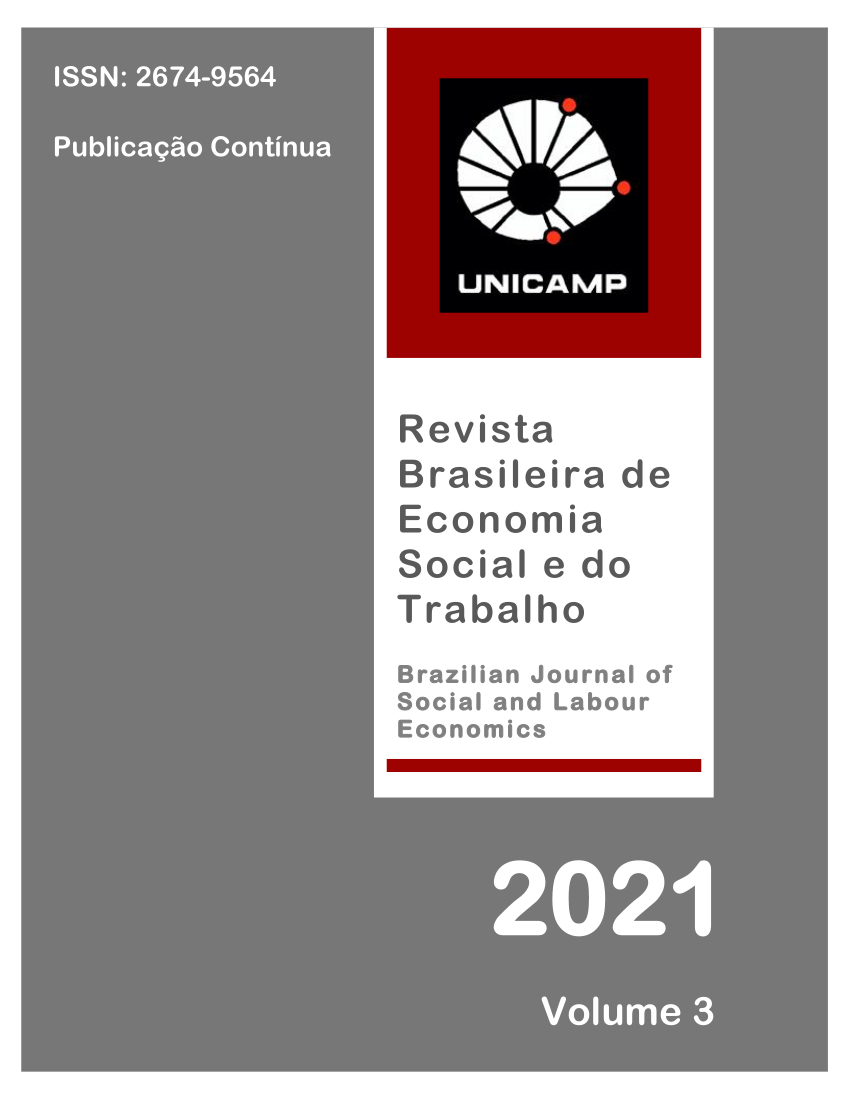Abstract
The digital transition in the first decades of the 21st century has hit Brazilian industry in the midst of a long-term weakening process, in which the progressive loss of competitiveness of the industrial system is added to the loss of participation of technology-intensive sectors in the national manufacturing production. In this context of specialization in sectors and tasks of low complexity, the Brazilian industry will suffer severely from the effects of the new wave of automation throughout the current decade. The article seeks to visualize possible scenarios, discuss the probable impacts of technological unemployment on Brazilian industry, and stimulate debate on policies for dealing with the problem.
References
Borghi, R. A. Z., & Bacic, M. J. (2021). Evolução do emprego formal e do número de estabelecimentos por porte e setor no Brasil: uma avalição da indústria no período 2002-2017. In A. C. Diegues, & F. Sarti (Orgs.), Brasil: Indústria e desenvolvimento em um cenário de transformação do paradigma tecnoprodutivo (pp. 89-114). CRV; Unicamp. IE.
Castro, A. B. (2001). A reestruturação industrial brasileira nos anos 1990: Uma interpretação. Revista de Economia Política, 21(3), 3–26. https://doi.org/10.1590/0101-31572001-1251
Centro de Gestão e Estudos Estratégicos (CGEE) (2020). Brasil: Mestres e Doutores 2019. Serviços de Informação sobre RH para CT&I. https://mestresdoutores2019.cgee.org.br
Centro de Gestão e Estudos Estratégicos (CGEE) (2021). Desenvolvimento tecnológico e mercado de trabalho – Digitalização e relação homem-máquina: mudanças e tendências na legislação e regulação em nível global. https://www.cgee.org.br/documents/10195/734063/cgee_sdt23_DTMT.pdf/761fb0b0-e889-4a90-9361-7121e0bc98c1?version=1.3
Dachs, B., & Zanker, C. (2015). Backshoring of production activities in European manufacturing. [MPRA Paper, No. 63868], Munich Personal RePEc Archive. https://mpra.ub.uni-muenchen.de/63868/1/MPRA_paper_63867.pdf
Diegues, A. C. (2021). As transformações na dinâmica de acumulação produtiva brasileira e a emergência de uma nova versão do industrialismo periférico. In A. C. Diegues, & F. Sarti (Orgs.), Brasil: Indústria e desenvolvimento em um cenário de transformação do paradigma tecnoprodutivo (pp. 243-264). CRV; Unicamp. IE.
Gala, P., Camargo, J. S. M. de, Magacho, G., & Rocha, I. (2018). Sophisticated jobs matter for economic complexity: An empirical analysis based on input-output matrices and employment data. Structural Change and Economic Dynamics, 45, 1–8. https://doi.org/10.1016/j.strueco.2017.11.005
Gimenez, D., & Santos, A. (2019). Indústria 4.0, manufatura avançada e seus impactos sobre o trabalho. [Texto para Discussão, n. 371], Instituto de Economia, Unicamp. https://www.eco.unicamp.br/images/arquivos/artigos/TD/TD371.pdf
Hidalgo, C. (2009). The dynamics of economic complexity and the product space over a 42 year period. [CID Working Paper, No. 189], Center for International Development, Harvard University. https://www.hks.harvard.edu/centers/cid/publications/faculty-working-papers/dynamics-economic-complexity-and-product-space-over-42-year-period
Hidalgo, C. (2021). Economic complexity theory and applications. Nature Reviews Physics, 3, 92–113. https://doi.org/10.1038/s42254-020-00275-1
Instituto Euvaldo Lodi (IEL) (2017). Mapa de clusters tecnológicos e tecnologias relevantes para a competitividade de sistemas produtivos: Riscos e oportunidades para o Brasil diante de inovações disruptivas. https://www.portaldaindustria.com.br/publicacoes/2017/10/nota-tecnica-etapa-i-do-projeto-industria-2027/
Manyika, J., Sinclair, J., Dobbs, R., Strube, G., Rassey, L., Mischke, J., Remes, J., Roxburgh, C., George, K., O'Halloran, D., & Ramaswamy, S. (2012, November). Manufacturing the future: the next era of global growth and innovation. Mckinsey Global Institute. https://www.mckinsey.com/business-functions/operations/our-insights/the-future-of-manufacturing
Manyika, J., Chui, M., Miremadi, M., Bughin, J., George, K., Willmott, P., & Dewhurst, M. (2017, January). A future that works: automation, employment and productivitiy. Mckinsey Global Institute. https://www.mckinsey.com/featured-insights/digital-disruption/harnessing-automation-for-a-future-that-works/de-DE
Mazzucato, M., & Penna, C. (2015). Estado vs. mercados: uma falsa dicotomia. Revista Política Social e Desenvolvimento, (21), 8–15. https://issuu.com/politicasocial/docs/revista_21
Milberg, W., & Winkler, D. (2010). Trade, crisis, and recovery: Restructuring global value chains. In O. Cattaneo, G. Gereffi, & C. Staritz (Eds.), Global value chains in a postcrisis world: a development perspective (pp. 23-72). International Bank for Reconstruction and Development/The World Bank. https://openknowledge.worldbank.org/handle/10986/2509
Milberg, W., & Winkler, D. (2013). Outsourcing Economics: global value chains in capitalist development. Cambridge University.
Nogueira, M. O. (2019). Um pirilampo no porão: um pouco de luz nos dilemas da produtividade das pequenas empresas e da informalidade no país. Instituto de pesquisa Econômica Aplicada (IPEA). http://repositorio.ipea.gov.br/handle/11058/8087
Organisation for Economic Co-operation and Development (OECD) (2016). Enabling the next production revolution: the future of manufacturing and services [Interim Report]. https://www.oecd.org/mcm/documents/Enabling-the-next-production-revolution-the-future-of-manufacturing-and-services-interim-report.pdf
O’Sullivan, E., Andreoni, A., López-Gómez, C., & Gregory, M. (2013). What is new in the new industrial policy? A manufacturing systems perspective. Oxford Review of Economic Policy, 29(2), 432–462. https://doi.org/10.1093/oxrep/grt027
Rocha, M. A. (2019). Uma proposta para política de desenvolvimento produtivo e tecnológico: uma via para o Brasil no próximo paradigma tecnológico. Cadernos de Campo, (27), 17–38. https://periodicos.fclar.unesp.br/cadernos/article/view/13731
Sau, L. (2007). New pecking order financing for innovative firms: an overview. [Working Paper Series, No. 02/2007], Dipartimento di Economia, Università di Torino. https://mpra.ub.uni-muenchen.de/3659/1/MPRA_paper_3659.pdf
Suzigan, W., & Furtado, J. (2010). Instituições e políticas industriais e tecnológicas: reflexões a partir da experiência brasileira. Estudos Econômicos, 40(1), 7–41. https://doi.org/10.1590/S0101-41612010000100001
Suzigan, W., Garcia, R. C., & Feitosa, P. H. A. (2021). Instituições e os desafios da política industrial no Brasil. In A. C. Diegues, & F. Sarti (Orgs.), Brasil: Indústria e desenvolvimento em um cenário de transformação do paradigma tecnoprodutivo (pp. 313-334). CRV; Unicamp. IE.
Tcherneva, P. R. (2020). The case for a job guarantee. Polity.
World Economic Forum (WEF) (2020). The future of jobs Report 2020. https://www3.weforum.org/docs/WEF_Future_of_Jobs_2020.pdf

This work is licensed under a Creative Commons Attribution-NonCommercial-ShareAlike 4.0 International License.
Copyright (c) 2021 Marco Antônio Rocha


